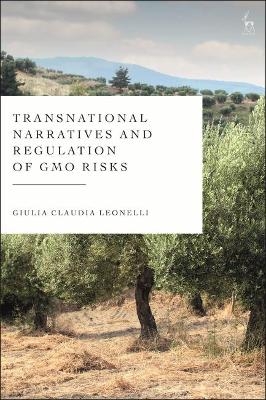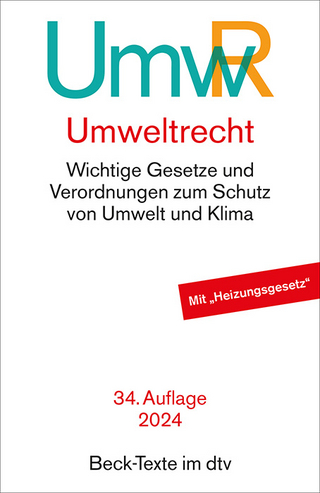
Transnational Narratives and Regulation of GMO Risks
Hart Publishing (Verlag)
978-1-5099-3738-7 (ISBN)
The book deconstructs hegemonic and counter-hegemonic transnational narratives on the governance of GMO risks, cutting across US law, EU law, the WTO Agreement on Sanitary and Phytosanitary Measures, and hybrid standard-setting regimes. Should uncertain risks be run unless adverse effects have been conclusively established, and should regulators only act where this is cost-benefit effective? Should risk managers make a convincing case that a product or process is safe enough for the relevant uncertain risks to be socially acceptable? How can intractable transnational regulatory conflicts be solved?
The book complements a close analysis of regulatory frameworks and case law with a more encompassing perspective on the political, socio-economic and distributional implications of different approaches to the regulation of health and environmental risks at times of globalisation.
The GMO deadlock thus becomes a lens through which to investigate the underlying value systems, goals, and impacts of transnational discourses on risk governance. Against this backdrop, the normative strand of analysis points to the limited ability of science and procedural deliberation to generate authentic agreement and to identify normatively legitimate solutions, in the absence of pre-existing shared perspectives.
Giulia Claudia Leonelli is Lecturer in Law at Birkbeck College, University of London and Research Fellow at the Transnational Law Institute, King’s College London, UK.
1. Introductory Overview: Transnational Narratives, Evidence-Based and Socially Acceptable Risk Approaches, Normative Analysis
I. The Broader Picture: Agricultural Biotechnologies and Transnational Controversies
II. The Methodological Framework: Transnational Legal Analysis and Transnational Narratives
III. The Institutional Strand of Analysis: Transnational Narratives on GE Organisms, Ideal Regulatory Models and Different Forms of Uncertainty
A. Mapping Different Forms of Scientific Uncertainty
B. The Hegemonic Transnational Narrative and Evidence-Based Paradigms
C. The Counter-Hegemonic Transnational Narrative and Socially Acceptable Risk Approaches
IV. Normative Analysis: Modern Paradigms and Post-Modern Deconstruction of Regulatory Approaches
2. Methodological and Normative Aspects: Transnational Legal Analysis as a Methodological Framework and the
Limits of Legal Proceduralisation
Part 1. Transnational Legal Analysis as a Methodological Framework
I. Law, Globalisation and Transnational Law
II. Transnational Legal Ordering Theory and Transnational Legal Orders
III. Transnational Legal Pluralism: Transnational Law as a Systems Theory Account of Law’s Evolution
IV. Transnational Law, Transnational Legal Narratives and Transnational Legal Analysis as a Methodological Framework
Part 2. Normative Analysis: The Limits of Modern Procedural Paradigms in the Post-Modern Transnational Scenario
V. The Normative Vacuum of Transnational Legal Studies
VI. Recoupling Law and Politics and Mapping Regulatory Conflicts Through Conflicts Law Theory
VII. Applications and Limits of Conflicts Law Theory
VIII. From Procedural Deliberative Paradigms to Substantive Deconstruction and Legal Re-Materialisation?
3. Extra-Territoriality: Foundations and Implications of the Transnational Hegemonic Narrative within US Governance of GE Organisms
I. From the Origins to the 2019 Executive Order: The Product-Based Model and Further Regulatory
Streamlining
II. The Role of the APHIS: GE Organisms and Plant Pest Risks
A. Regulation and Regulatory Implementation before the 2020 Reform
B. The 2020 Reform
III. The Role of the EPA: Plant-Incorporated Protectants
IV. The Role of the FDA: GE Food
V. Sound Science Approaches and Adherence to Sound Science: Deconstructing their Implications Th rough an Analysis of US Governance of GE Organisms
A. Sound Science, Risk Assessment and Regulatory Frameworks
B. Sound Science and US Governance of GE Organisms
C. Unpacking the Implications of Sound Science Approaches and Adherence to Sound Science
VI. Cost-Benefit Analysis: Deconstructing its Implications Through an Analysis of US Governance of GE Organisms
A. Cost-Benefit Analysis
B. Cost-Benefit Analysis and US Governance of GE Organisms
C. Unpacking the Implications of Cost-Benefit Analysis
VII. Conclusions of the Institutional Analysis. Deconstructing the Hegemonic Narrative and Evidence-Based Discourses from Within the Nation State: The Centrality of Individual Rights
VIII. Preliminary Normative Reflections: When (Sound) Science and Procedural Deliberation Fail
4. Across Extra-Territoriality and Legal Pluralisation: EU Regulation of GE Organisms. The Counter-Hegemonic Narrative and the Question of Regulatory Implementation
I. The pre-2015 Regulatory Framework: The 2001 Deliberate Release Directive and the 2003 Food and Feed Regulation
II. The EU Regulatory Framework and Socially Acceptable Risk Approaches: Prudential Risk Assessment and Uncertainties
III. The EU Regulatory Framework and Socially Acceptable Risk Approaches: The Notion of Intended Level of Protection, The Precautionary Principle and OLFs
IV. Regulatory Implementation: From Socially Acceptable Risk to Evidence-Based Approaches
V. The Substantive Gap between the EFSA’s Approach and More Prudential Perspectives: TestBioTech
VI. The Substantive Gap in Risk Management: The Commission’s Alignment with evidence-Based Risk Governance versus Socially Acceptable Risk Approaches
A. The First Group of Cases: The Centrality of the Precautionary Principle
B. Upper Austria: Fleshing Out the Rationale of Socially Acceptable Risk Approaches
C. The Final Group of Cases: OLFs, Coexistence and Precaution
VII. Interim Conclusions: The Counter-Hegemonic Narrative, Socially Acceptable Risk Approaches and the Failure of
Science and Procedural Deliberation
VIII. Final Remarks on Legal Pluralisation (I): The 2015 Reform on the Cultivation of GE Crops
IX. Final Remarks on Legal Pluralisation (II): The 2015 Reform from a Socially Acceptable Risk Perspective. Procedural Compromises and a Twofold Substantive Defeat
X. Conclusions: Findings of the Institutional and Normative Strands of Enquiry
5. Legal Pluralisation: The SPS Agreement, GE Organisms and the Impossible Quest for Scientific Objectivity. From Sound Science to Transnational Regulatory Convergence and Trade Liberalisation
I. The SPS Agreement: Relevant Provisions
II. The Origins: EC – Hormones and Hazard-Related Uncertainties
III. The Appellate Body’s Report in EC – Hormones: Ascertainable Risk and Theoretical Uncertainty
IV. Australia – Salmon and Risk-Related Uncertainties
V. Japan – Agricultural Products II and the Scientific Substantiation of Measures Enacted to Comply with the ALOP
VI. Japan – Apples: Article 5.7 as a ‘Safeguard’ Clause, Compliance Proceedings and Stricto Sensu De Novo Review
VII. EC – Biotech: Hazard-Related Uncertainties, Socially Acceptable Risk and the Cartagena Protocol. Sound Science as a Meta-Norm?
A. The EC’s General Moratorium and Product-Specific Moratoria
B. Conflicting Narratives, Conflicting Goals: The Case of the Cartagena Protocol. Interpreting the SPS Agreement in
Light of the Precautionary Principle?
C. The Analysis of National Measures: Confirming the Irrelevance of Hazard-Related Uncertainties under
Articles 5.1 and 5.7
D. The Implications of the Evidence-Based Narrative: (Lato Sensu) De Novo Review, Regulatory Convergence
and Trade Liberalisation. Can Sound Science be a Procedural Meta-Norm?
VIII. Has Anything Really Changed Since EC – Biotech? Nothing has Quite Changed
A. US/Canada – Continued Suspension
B. Australia – Apples
C. Following Developments Up to Nowadays
IX. Conclusions: GE Organisms, the SPS Agreement and the Evidence-Based Narrative
6. Legal Hybridisation: The Codex, NGO Regulatory Standards and GE Organisms. Adherence and Challenges to the Hegemonic Narrative
I. The Codex and its Linkage with the SPS Agreement: Towards an Evidence-Based, Baseline Threshold of Safety
II. The Codex Principles and Guidelines on the Assessment of Foods Derived from Biotechnology
III. Normative Reflections: The Gap between Product- and Process-Based Models and the Failure of Deliberation
IV. Regulatory Standards Enacted by Non-Profit NGOs: Back to Socially Acceptable Risk Approaches
V. Precaution, OLFs and the Challenge to Cost-Benefit Analysis: From Agricultural Biotechnologies and Food Security to Food Sovereignty
VI. Diagonal Conflicts and the Impossibility of Embedding Societal Standards
VII. Conclusions: Legal Hybridisation and Narratives on GE Organisms
7. Conclusions: Transnational Legal Analysis, Transnational Narratives on Risk and the Failure of Science and Deliberation. Towards Legal Re-Materialisation?
I. Methodology: The Value of Transnational Legal Analysis as a Methodological Framework
II. Institutional Analysis: The Social and Political Construction of Transnational Narratives on GE Organisms and Risk
Governance
III. Normative Analysis: The Failure of Science and Procedural Deliberation. Towards Legal Re-Materialisation?
| Erscheinungsdatum | 03.12.2021 |
|---|---|
| Verlagsort | Oxford |
| Sprache | englisch |
| Maße | 156 x 234 mm |
| Gewicht | 630 g |
| Themenwelt | Recht / Steuern ► EU / Internationales Recht |
| Recht / Steuern ► Öffentliches Recht ► Umweltrecht | |
| ISBN-10 | 1-5099-3738-2 / 1509937382 |
| ISBN-13 | 978-1-5099-3738-7 / 9781509937387 |
| Zustand | Neuware |
| Haben Sie eine Frage zum Produkt? |
aus dem Bereich


